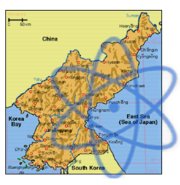North Korea agrees to end nuclear program
Thursday, February 15, 2007
North Korea has agreed to end its nuclear program and close down its nuclear facility at Yongbyon within 60 days. An international team of inspectors will be allowed into their facilities in exchange for financial and humanitarian aid, along with economic and energy assistance. The deal was reached during "six party talks" involving North Korea, the United States, Japan, China, South Korea and Russia.
In return, North Korea will receive 50,000 metric tons of fuel oil. If it closes down more facilities, as planned, the country will get 1 million tons eventually. So far there is no agreement on getting rid of North Korea's plutonium stockpile, which is estimated to be sufficient to produce six to eight atomic bombs.
U.S. President George W. Bush called the agreement a "unique deal". "First of all, unlike any other agreement, it brings together all of North Korea's neighbors in the region, as well as the United States" said Bush during a press conference at the White House.
According to Bush, the United Nations also agrees with the terms of the resolution. Washington's former envoy to the United Nations, John Bolton, however, said the agreement undercut UN sanctions.
As a consequence of the development in North Korea's policy, South Korea is now set to resume high-level talks with its northern neighbor. The negotiations will start on February 27, 2007 in Pyongyang and could lead to the delivery of rice and fertilizer to the impoverished North.
Sources
- AFP. "South Korea set to resume talks with North" — ABC News, February 15, 2007
- Army Sgt. Sara Wood. "North Korea agrees to nuclear disarmament" — Air Force Link, February 14, 2007
